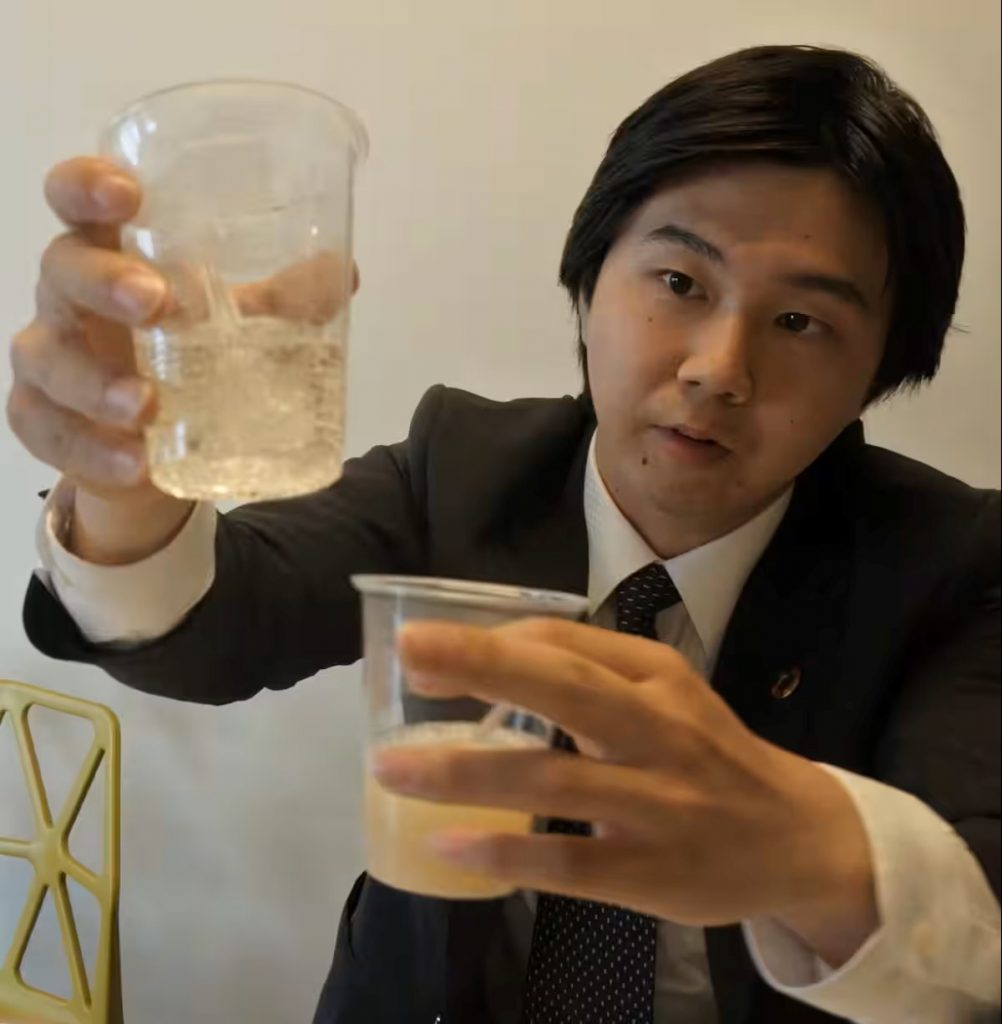このページを 日本語 で読む
The idea of "phase-free" living — using products that work both in daily life and in emergencies — is gaining traction in disaster preparedness. Most people focus on securing food, water, and toilets after a disaster. However, one essential need is often overlooked: clean laundry. To address this, Nagoya-based Ethical Japan has developed an enzyme-based detergent that requires very little water to clean clothes effectively. Unlike conventional detergents that wash dirt away, this product works by breaking dirt down at the molecular level.
It is also a multi-purpose cleaning agent. For laundry, it needs only 20 grams of detergent mixed with a bucket (five liters) of water for one wash. That's about one-tenth the water used by a washing machine. Clothes can be cleaned simply by soaking in the solution — no scrubbing or machine agitation needed.
The detergent's cleaning power comes from a combination of sodium percarbonate and enzymes. As sodium percarbonate releases oxygen, it activates the enzymes. Together, they break down dirt without relying on surfactants.
Unlike surfactant-based detergents, this method leaves no slimy residue, making rinsing almost unnecessary. This not only saves water but also avoids the environmental risks linked to conventional detergents.
Multiple Uses Spurred by Noto Earthquake
Ethical Japan's detergent offers several additional benefits beyond conserving water. It is gentle on the skin, making it safe for use for cleaning baby items such as bottles. Its low environmental impact allows it to be safely poured down the drain without harming aquatic life. This contrasts with conventional surfactants, which are known to cling to fish gills and disrupt breathing.
Its versatility also extends to everyday use. Even items that typically cannot be machine-washed can be disinfected, deodorized and bleached.
Plush toys, for instance, can be sanitized simply by soaking. Spraying or wiping the solution onto items like kendo armor or child car seats provides an effective cleaning alternative. Some fire departments have even begun testing its potential for sanitizing firefighting gear.
Demand for laundry solutions tends to rise in areas that experience prolonged water outages. In December 2024, Ethical Japan surveyed around 1,000 residents from disaster-affected regions, including the Noto Peninsula, Kumamoto, and Tohoku. 74.2% of respondents said they were "very concerned" or "somewhat concerned" about being unable to do laundry during a disaster.
Enzymes, the main ingredient, are more costly to produce than surfactants. For now, it is a trade-off for challenging the long-held belief that detergents must contain surfactants. Even so, Ethical Japan has kept its multi-purpose detergent affordable: ¥1,485 JPY (about $10 USD), tax included, for a one-week pack of seven sachets. Sold through the company's website, shipping costs a modest ¥185 ($1.25).
A company representative said, "We hope people will use it in daily life as a way to be prepared for disasters."
'We Want to Reduce Disaster-Related Deaths'
In an interview, JAPAN Forward and The Sankei Shimbun asked Hiroto Iwama, Ethical Japan's director, about the role of laundry in emergencies
What prompted you to develop a laundry detergent?
During my volunteer work in disaster-hit areas after the Noto Peninsula earthquake last January [2024], I witnessed firsthand how severe the water shortage was. In shelters, some people had no choice but to wash their clothes by hand in freezing water. Others, unable to endure the cold, spent half a day traveling into the city just to use laundromats. That experience made me realize there was an urgent need for a detergent that could be used with very little water.
Why hasn't detergent become more common as part of emergency supplies?
When people think about emergency stockpiles, they usually focus on water, food, and portable toilets. Laundry simply doesn't come to mind, so detergent rarely makes it onto supply request lists at evacuation shelters. Even though the need is real, it hasn't been widely recognized. And because major manufacturers haven't paid much attention to it, product development in this area has been slow.
What are your hopes going forward?
Soiled undergarments can lead to skin problems and infections, and in some cases weaken the immune system to the point of becoming life-threatening. On top of that, dirty clothing adds significant mental stress. By making this multi-purpose detergent available in disaster areas — and giving people a way to keep their clothes clean — we hope to reduce the risk of disaster-related deaths, even if only a little.
RELATED:
- How to Prepare for an Earthquake: Lessons from the Life Safety Learning Center
- Innovative Water-Recycling Showers Bring Relief to Evacuees After Earthquake
- Japan Should Host A Yearly Conference on Disaster Resiliency for Indo-Pacific Youth
(Read the interview and report in Japanese.)
Interview by Toyohiro Ichioka, The Sankei Shimbun
このページを 日本語 で読む
